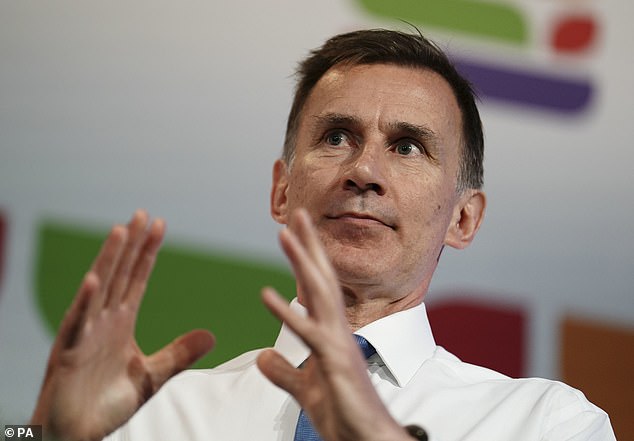RUTH SUNDERLAND: How Italian bank job hits UK
- Last thing Jeremy Hunt will want is to move back into Liz Truss territory
- Bank bosses already on back foot after Nigel Farage affair
- What an exquisite irony if they escape a windfall tax, courtesy of Giorgia Meloni
The Italian government of Giorgia Meloni has probably done the UK’s bloated and dysfunctional high street lenders a big favour. If they avoid being hit by a windfall tax in the Budget, it may well be thanks to her.
Meloni’s administration, the most Right-wing since Mussolini, launched a tax grab last week on Italy’s banks.
Like their UK counterparts, Italy’s lenders have been hauling in profits from rising interest rates by giving miserly increases to savers as they charge borrowers more.
The idea was to use windfall tax revenues to help families suffering from the cost-of-living crisis. No doubt many Italians would endorse that plan, but markets took fright in a major way.
A rapid reverse-ferret ensued when it became clear Ms Meloni was in danger of looking like Italy’s answer to Liz Truss, albeit more stylish.

Hands on: The last thing Chancellor Jeremy Hunt will want to contemplate is any move that might take him back into Liz Truss territory
The market reaction will not have been lost on Number 11. With the public finances in their current state, Chancellor Jeremy Hunt has been considering a windfall tax on the UK lenders. But the last thing he wants is any more chaos on the markets.
Slapping a windfall tax on lenders is tempting for a number of reasons.
Banks have few friends even a decade and a half after the financial crisis. The billions the banks are making from net interest income do look like windfall profits.
The cash sluicing in is not the result of any great skill or acumen. Banks are making mega-profits through the simple expedient of exploiting interest-rate increases at the expense of their own customers.
They are also benefiting, through no effort or merit of their own, from the fact that the Bank of England is paying tens of billions of pounds in interest on the reserves that lenders deposit in Threadneedle Street.
We are talking very big money.
An analysis in June by our sister paper, The Mail on Sunday, found that the largest lenders made £44billion in 2022 in net interest income (the difference between what they charge borrowers and pay to savers).
Chief executives have also cashed in. The big four – Barclays, Lloyds, NatWest and HSBC – paid their bosses a total of nearly £20m between them last year.
The scandal over Nigel Farage’s Coutts account, which claimed the scalp of parent company NatWest’s chief executive, has further damaged the industry’s reputation. One can only imagine what Coutts might have written in a dossier about Meloni.
Farage is the tip of the debanking iceberg. Some 1,000 accounts are being closed daily, some for good reasons, but others involving innocent customers deprived of essential financial services with no explanation.
We have had windfall taxes in the UK in the past, under Margaret Thatcher of all people. In 1981, chancellor Geoffrey Howe slapped a levy on the banks, which he believed were getting off scot-free in the recession, raising around £400m.
Arguably, the larger banks were hit with a stealth windfall tax in the last Budget. I won’t bore you with the detail, but changes to corporation tax and the bank levy mean big lenders pay a higher rate overall.
Other European countries have imposed bank windfall taxes, including Spain, Hungary and Lithuania, which is not surprising after they made themselves easy targets.
But the market reaction to the Italian bank job will give Hunt and others pause for thought. The last thing he will want to contemplate is any move that might take him back into Truss territory.
Bank bosses, who are nowadays obliged to pay homage to woke ideology, are already on the back foot after the Farage affair.
What an exquisite irony if they escape a windfall tax, courtesy of Giorgia Meloni.











